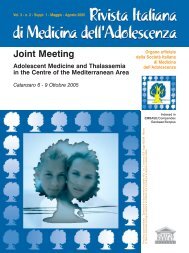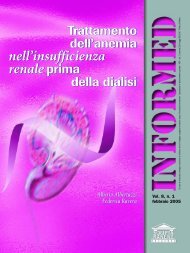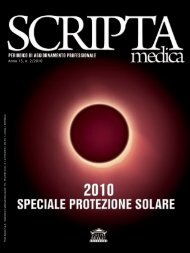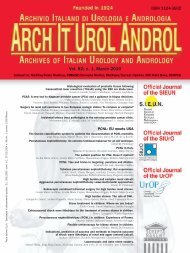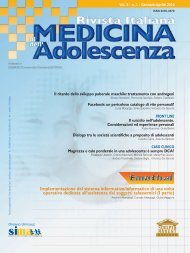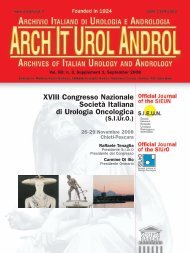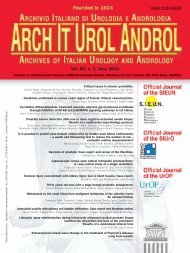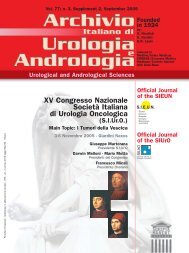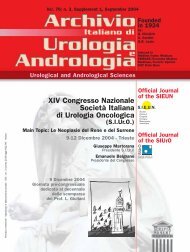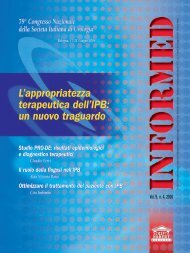XX Congresso Nazionale Società Italiana di ... - Salute per tutti
XX Congresso Nazionale Società Italiana di ... - Salute per tutti
XX Congresso Nazionale Società Italiana di ... - Salute per tutti
You also want an ePaper? Increase the reach of your titles
YUMPU automatically turns print PDFs into web optimized ePapers that Google loves.
<strong>XX</strong> <strong>Congresso</strong> <strong>Nazionale</strong> <strong>Società</strong> <strong>Italiana</strong> <strong>di</strong> Urologia Oncologica<br />
ni 3 , Lara Bellar<strong>di</strong>ta 1 , Rosella Bellomira 1 , Davide Biasoni 2 ,<br />
Mario Catanzaro 2 , Laura Catena 4 , Maria Olga Giganti 1 , Nicola<br />
Nicolai 2 , Giuseppe Procopio 4 , Silvia Stagni 2 , Tullio<br />
Torelli 2 , Annalisa Villa 1 , Riccardo Valdagni 1<br />
1 Prostate Program, Scientific Director’s Office; 2 Div. Urology; 3 Div.<br />
Ra<strong>di</strong>ation Oncology; 4 Div. Me<strong>di</strong>cal Oncology; Fondazione IRCCS<br />
Istituto <strong>Nazionale</strong> dei Tumori, Milan<br />
Prostate cancer is one of the most frequent cancers in<br />
men living in developed countries. In Italy 43,000 incident<br />
cases, 9,200 deaths and 174,000 prevalent cases<br />
were estimated in 2005.<br />
Prostate cancer patients might be addressed to <strong>di</strong>fferent<br />
therapies (surgery, external ra<strong>di</strong>otherapy, brachytherapy,<br />
hormonal therapy, chemotherapy, observational strategies<br />
and, in selected settings, cryotherapy and HIFU),<br />
which may cause <strong>di</strong>fferent side effects that impact on the<br />
quality of life significantly.<br />
Prostate Program at Fondazione IRCCS Istituto <strong>Nazionale</strong><br />
Tumori, activated in September 2004, re-arranged ex<strong>per</strong>imental<br />
and clinical research on prostate cancer within a<br />
<strong>di</strong>sease-focused frame.<br />
With respect to clinical research, priorities were the constitution<br />
of a Multi<strong>di</strong>sciplinary Team (MDT) able to address all<br />
the <strong>di</strong>fferent aspects of prostate cancer <strong>di</strong>agnosis, treatment<br />
and follow up, and the work out of institutional <strong>di</strong>agnostic,<br />
therapeutic and observational guidelines to create<br />
a common language and working methodology.<br />
The MDT currently includes: the Prostate Program Director,<br />
6 part-time urologists, 3 full-time prostate-de<strong>di</strong>cated<br />
ra<strong>di</strong>ation oncologists, 2 part-time me<strong>di</strong>cal oncologists, 2<br />
prostate-de<strong>di</strong>cated psychologists, 2 part-time prostatede<strong>di</strong>cated<br />
palliative care ex<strong>per</strong>ts (on demand), 1<br />
prostate-de<strong>di</strong>cated research fellow specialized in ra<strong>di</strong>ation<br />
oncology, 1 prostate-de<strong>di</strong>cated research fellow specialized<br />
in me<strong>di</strong>cal oncology, 3 prostate-de<strong>di</strong>cated research<br />
fellows specialized in psychology.<br />
The Team also includes as core members: 1 full-time project<br />
manager, 1 full-time secretary, 1 part-time data entry, 1<br />
part-time data manager, 2 part-time uro-pathologists, 2<br />
part-time immunologists, several ancillary capabilities such<br />
as laboratory and ra<strong>di</strong>ology (magnetic resonance, computed<br />
tomography, ultrasonography, nuclear me<strong>di</strong>cine).<br />
The Multi<strong>di</strong>sciplinary Clinic was started in March 2005<br />
and is organized as follows:<br />
– the clinic – every Friday from 8 am to 1 pm: a urologist, a<br />
ra<strong>di</strong>ation oncologist, a me<strong>di</strong>cal oncologist and a psychologist<br />
synchronously examine 10 prostate cancer patients;<br />
– the clinical case <strong>di</strong>scussion - every Monday from 1 pm to<br />
3 pm: the MDT <strong>di</strong>scusses the cases examined on the previous<br />
Friday to share the decisions, to formulate in<strong>di</strong>vidualized<br />
therapeutic or observational strategies, and to<br />
evaluate adherence to institutional <strong>di</strong>agnostic and therapeutic<br />
guidelines; the multispecialistic team also <strong>di</strong>scusses<br />
particularly challenging cases seen mono<strong>di</strong>sciplinarily.<br />
Patients’ data are entered in e-Prostate, an electronic<br />
me<strong>di</strong>cal record developed in collaboration with Istituto<br />
Trentino <strong>di</strong> Cultura.<br />
From March 2005 to December 2009, 1747 multi<strong>di</strong>sciplinary<br />
clinics have been <strong>per</strong>formed.<br />
Since its start our organizational model has been characterized<br />
by a high level of dynamicity and flexibility.<br />
A Steering Committee composed of the Prostate Program<br />
Director, the project manager, the senior urologist, the<br />
senior ra<strong>di</strong>ation oncologist, the senior me<strong>di</strong>cal oncologist<br />
and the senior psychologist, deals with relational problems<br />
within the MDT and introduces organizational<br />
changes in the work flow.<br />
A full-time secretary is in charge of checking the clinic lists<br />
weekly, contacting patients to confirm the appointment,<br />
and re-organizing the clinic list in case of special or urgent<br />
requests. A quality assurance assessment during the clinical<br />
case <strong>di</strong>scussion checks the quality of information offered<br />
to patients and the quality of care provided by the<br />
multi<strong>di</strong>sciplinary team. In our ex<strong>per</strong>ience the multi<strong>di</strong>sciplinary<br />
approach to prostate cancer has proved successful<br />
to deal with the complexity of the <strong>di</strong>sease.<br />
Patients and their significant others receive adequate information<br />
on the <strong>di</strong>sease, on all the possible therapeutic or observational<br />
strategies, on their related side effects and on rehabilitation<br />
procedures, reporting the good feeling of being<br />
taken care of by a team and of having an administrative goto<br />
<strong>per</strong>son for any need. Patients also benefit from the psychological<br />
counseling in the decision making phase.<br />
The MDT agrees on treatment and observational strategies,<br />
manages complex cases inter- and multi<strong>di</strong>sciplinarily and<br />
shares responsibility on critical issues like comorbi<strong>di</strong>ties or<br />
exclusion from protocols. At the same time, the MDT takes<br />
advantage from the presence of the prostate-de<strong>di</strong>cated<br />
psychologists who add their know how to the evidencebased<br />
specialistic approach, thus helping accept patients<br />
as the combination of body and mind and consider education-related<br />
and cultural factors as important as clinical<br />
ones. It is a fact that in both the clinic and the case <strong>di</strong>scussion<br />
setting, multi<strong>di</strong>sciplinary working implies a challenging<br />
dynamism of the patient-doctor relationship but also<br />
of the doctor-to-doctor relationships and allows a continuous<br />
improvement of the multispecialistic knowledge. It<br />
must be underlined however that in our ex<strong>per</strong>ience the<br />
synchronous participation of <strong>di</strong>fferent specialists in the<br />
clinic does not guarantee the success of the multi<strong>di</strong>sciplinary<br />
approach. The clinical case <strong>di</strong>scussion is as fundamental<br />
for our working inter- and multi<strong>di</strong>sciplinarily as<br />
examining prostate cancer patients collegially.<br />
References<br />
1. Basler JW, Jenkins C, Swanson G. Multi<strong>di</strong>sciplinary management of<br />
prostate malignancy. Curr Urol Rep 2005; 228-234.<br />
2. Carducci MA, Carroll PR. Multi<strong>di</strong>sciplinary management of advanced<br />
prostate cancer: changing <strong>per</strong>spectives on referring patients and enhancing<br />
collaboration between oncologists and urologists in clinical trials.<br />
Urology 2005; 65:18-22.<br />
3. Fowler FJ. Jr, McNaughton Collins M, Albertsen PC, et al. Comparison<br />
of recommendations by urologists and ra<strong>di</strong>ation oncologists for treatment<br />
of clinically localized prostate cancer. JAMA 2000; 283:3217-3222.<br />
4. Hudak JL, McLeod DG, Brassell SA, et al. The design and implementation<br />
sof a multi<strong>di</strong>sciplinary prostate cancer clinic. Urol Nurs 2007;<br />
27:491-498.<br />
5. Inghelmann R, Grande E, Francisci S, et al. Regional estimates of<br />
prostate cancer burden in Italy 2007. Tumori 2007; 93:380-386.<br />
6. Kagan AR. The multi<strong>di</strong>sciplinary clinic 2005. Int J Ra<strong>di</strong>at Oncol Biol<br />
Phys 2005; 61:967-968.<br />
50<br />
Archivio Italiano <strong>di</strong> Urologia e Andrologia 2010; 82, 2, Supplemento 1




